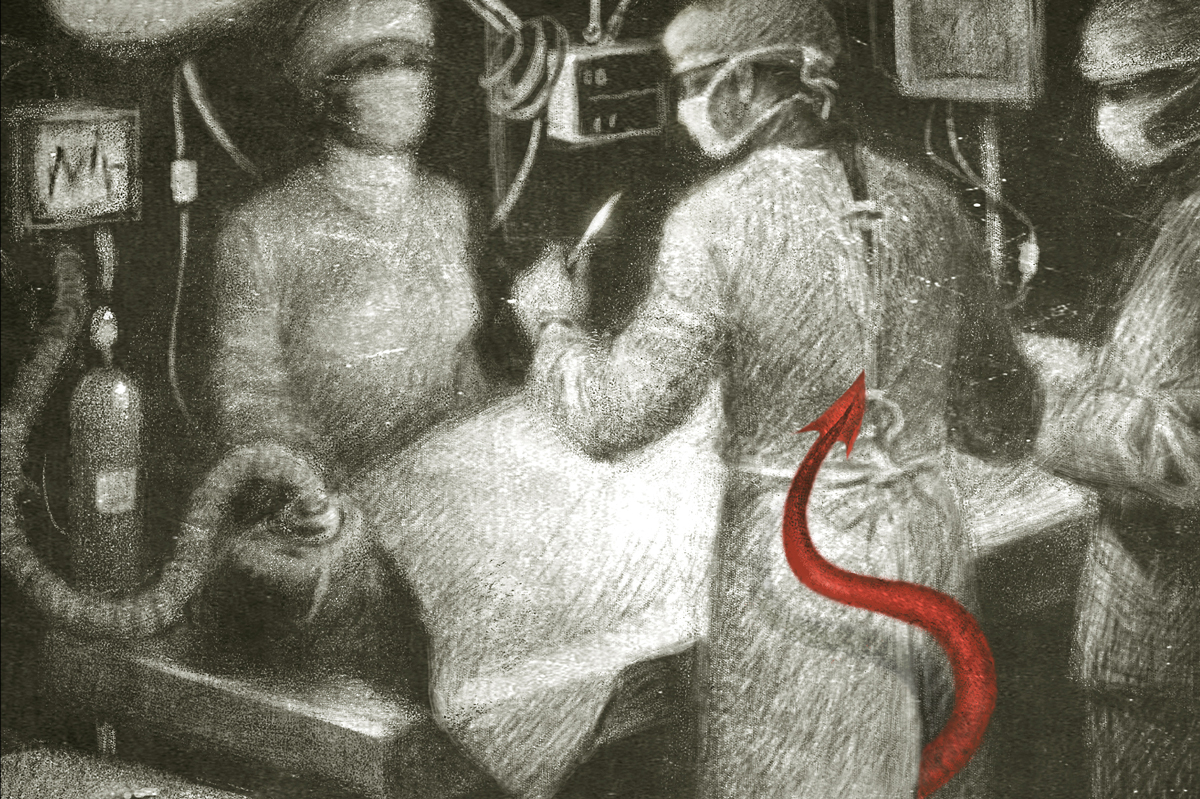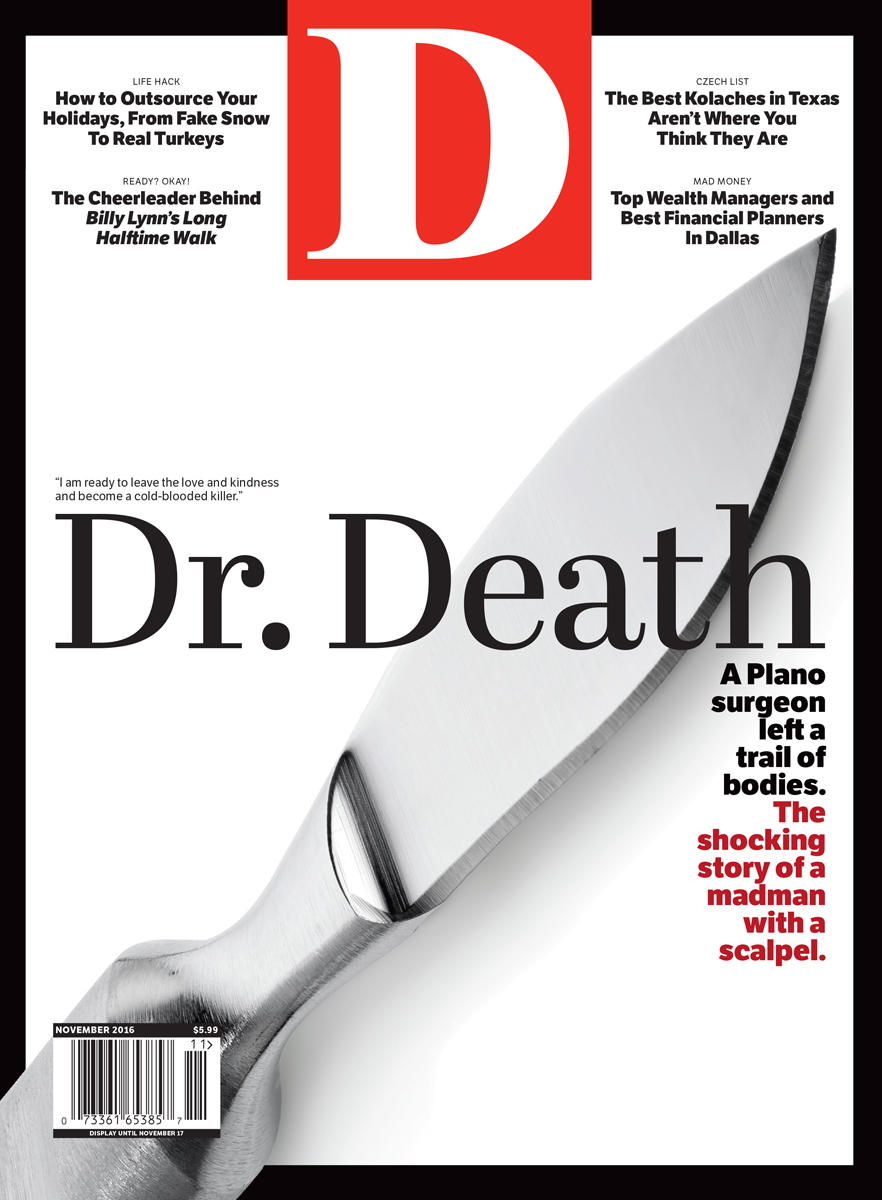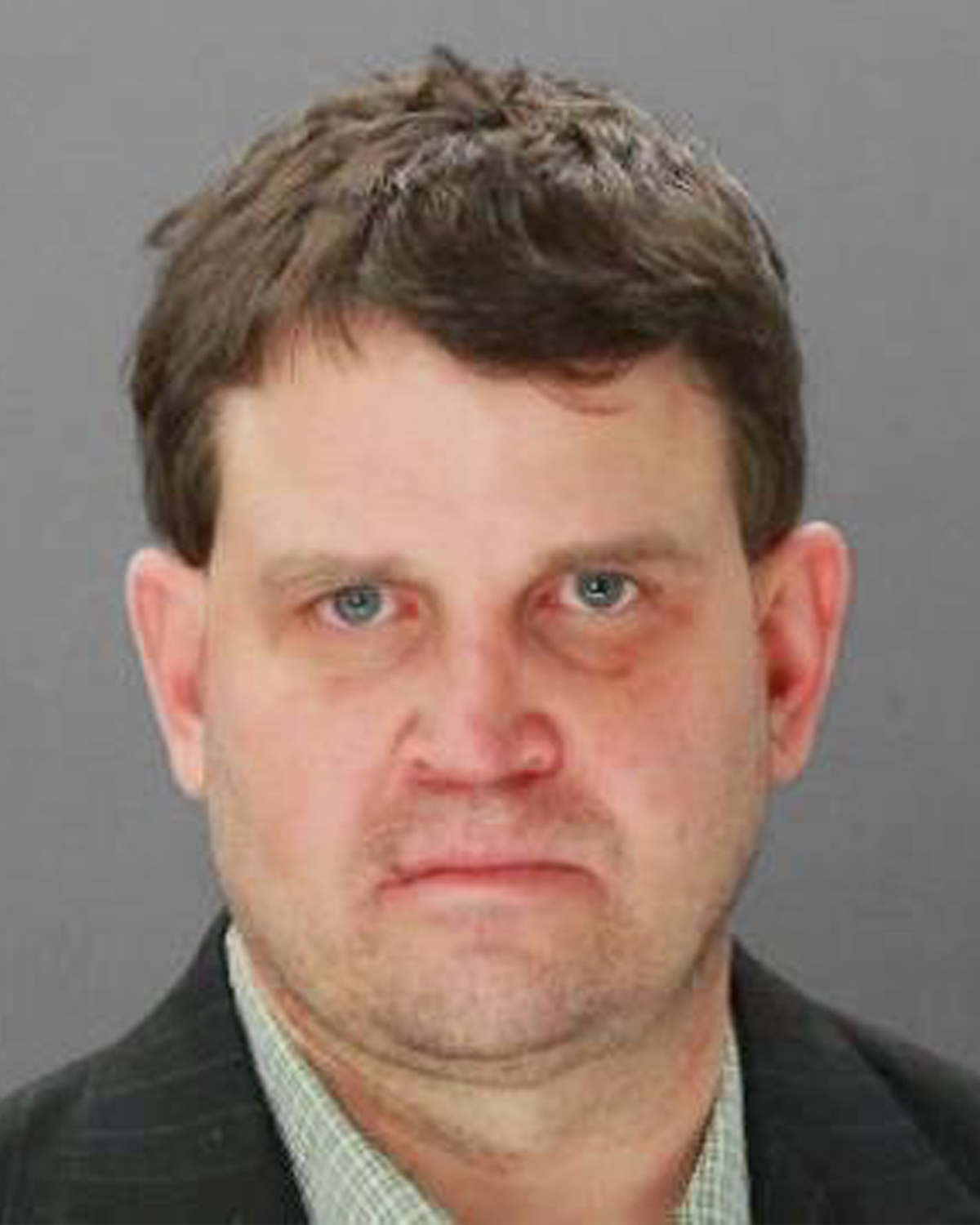Lee Passmore can’t feel his feet. His right leg is as stiff as his pressed blue jeans, and when he walks, he appears to use his hips to heave it forward. He also vibrates—his chest shakes, his right hand jitters. But Passmore is one of the lucky ones. He’ll tell you as much. He’s alive.
In November 2011, Passmore was hooked on prescription opiates. They numbed the pain radiating from his lower back, down each of his legs. He thought surgery might give him some relief, eliminate the need for drugs, solve both problems at once. His pain management specialist advised against an operation. But then he gave Passmore the card of a neurosurgeon named Christopher Duntsch.
Duntsch had only been in the Dallas area for a few months. He was taller than 6 feet, with a stubby nose and neatly cropped hair above bright blue eyes, and he had crafted a strategy that endeared him to patients and to referring physicians: I’m the best, he’d tell them. He always had a plan, always had a pitch, always had a way to fix you. His fellow neurosurgeons found him to be fast-talking and cocksure, a bit of a loner. And yet nearly all who met him said they liked him immediately.
But he’d make troubling, bizarre pronouncements, like “Everybody’s doing it wrong. I’m the only clean minimally invasive guy in the whole state.” That’s according to Dr. Mark Hoyle, who was the general surgeon during Passmore’s surgery. He met Duntsch that day in the physician lounge at Baylor Regional Medical Center at Plano, where the operation occurred. “I thought he was either really, really good, or he’s just really, really arrogant and thought he was good,” Hoyle says now.
This would be the first and last time Hoyle worked next to Duntsch. Hoyle’s job was to cut Passmore open and sew him up, and on December 30, 2011, he made a small incision just above the 36-year-old’s groin and moved the blood vessels and organs out of the way, allowing Duntsch clear access to the lower spine to remove a herniated disc. The disc was pressing on a nerve, which caused the pain.
But as Duntsch worked, Hoyle looked over and saw blood and not much else. It was pouring out of the epidural blood vessels and pooling in the disc space. But Duntsch kept going, as if he were fishing in a pond at night, saying he was working by feel, not sight. He announced that he would be removing the ligament that separates the disc from the spinal canal. This posterior longitudinal ligament is one of the spine’s two major stabilizers. It’s less than a millimeter from the spinal canal. Hoyle stepped in front of Duntsch to block his way.
“We need to talk about this,” Hoyle said, locking eyes with him. “That’s dangerous—even that attitude is dangerous.” Duntsch relented, allowing Hoyle to move in, stop the bleeding, and clean out the wound.
The operation continued. Duntsch placed a surgical cage where the disc was, to widen the opening around the nerve roots and relieve the pressure that was causing Passmore’s pain. But Hoyle says an X-ray later showed it was positioned too far to the left. When Duntsch tried to reposition it, he stripped a screw; the cage wasn’t going anywhere.
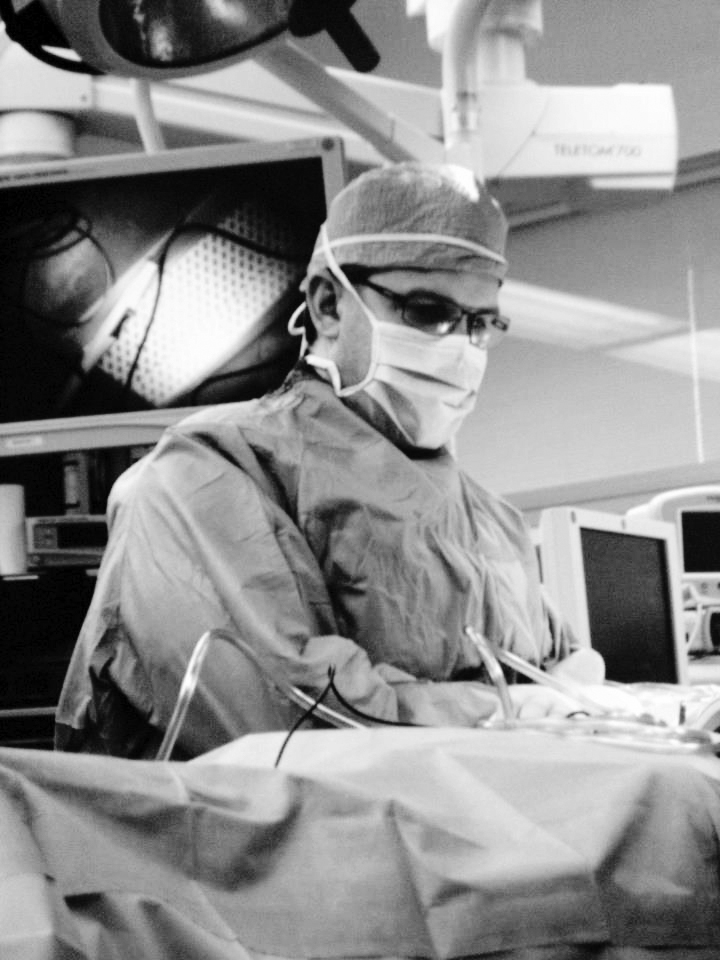
Hoyle called the whole surgery sloppy, enough so that he canceled the remaining three or four operations he had scheduled with Duntsch and vowed never to work with him again. He was the first surgeon to do so, but not the last. Duntsch’s patient outcomes would draw lots of attention over the years. There was Kellie Martin, who died from massive blood loss after a surgery at Baylor Plano. There was Floella Brown, whose sliced vertebral artery triggered the stroke that killed her at Dallas Medical Center. There was Duntsch’s childhood friend, Jerry Summers, who woke up from a procedure unable to move his arms and legs. There was a dissection of one patient’s esophagus, and screws that an indictment labeled “far too long” that caused significant blood loss in another patient. One surgeon described these as “never events.” They shouldn’t ever happen in someone’s entire career. And yet they occurred in Duntsch’s operating rooms over a period of just two years.
As these cases became public record, rumors circulated of late-night partying leading into early-morning rounds, and whispers of drug and alcohol abuse became shouts. Investigations took patients and attorneys back to where Duntsch had had such a promising beginning—in Memphis, at the University of Tennessee Health Science Center, where he earned both an M.D. and a Ph.D. He ran two labs, is listed as one of three inventors on a successful patent, raised millions of dollars in grant funding, and once gave a tour to the governor of Tennessee as he explained the stem cell research occurring at the university.
But today, about five years after the Passmore surgery, Duntsch sits in Lew Sterrett Justice Center awaiting trial, the rare physician to be indicted on multiple counts of aggravated assault related to what happened in his operating rooms. He wears a gray-and-black-striped uniform, not unlike a set of scrubs.
On paper, the 40-year-old man who arrived in Dallas in the summer of 2011 was a completely different Christopher Duntsch than the one who was introduced to the public after more than a dozen allegations of severely botched surgeries.
Duntsch had a comfortable upbringing. He was born in Montana, but his family settled in a suburb east of Memphis where the median household income is about $30,000 higher than the rest of the country. He was the oldest of four—he has two brothers, Nathan and Matt, and a sister, Liz—and attended a private high school. His father, Donald, was a missionary and a physical therapist. His mother, Susan, taught school.
He stayed in town for his undergraduate degree, emerging from the University of Memphis in 1994. He stayed local for medical school, enrolling the next year at the University of Tennessee Health Science Center. His CV proclaims that he earned a doctorate in microbiology from the prestigious St. Jude Children’s Research Hospital, graduating summa cum laude. St. Jude says there was no such program at the hospital at that time. (He also appears in no yearbooks from the University of Tennessee Health Science Center at the time in which he says he earned his Ph.D., and the school declined to verify his claims, citing a federal privacy law.) He did earn his M.D., doing so well that he was among the 12 percent of medical school graduates in his class named to the elite Alpha Omega Alpha Medical Honor Society. He stayed at the University of Tennessee for his surgical residency, spending the standard five years on neurosurgery and one year learning general surgery. In 2005, about a third of the way through the six-year program, department chairman Dr. Jon Robertson appointed him program director of the school’s tissue bank, where he’d supply samples to scientists and oversee two labs. He gained experience writing grants, and earned more than $3 million in local, state, and federal funding for research projects where he served as principal or co-principal investigator.
He was constantly involved in research, and, around 2006, he saw a way to commercialize discoveries by renowned Russian stem cell scientists Valery Kukekov and Tatyana Ignatova, a husband-and-wife team. It is during this period that Duntsch’s carefully built façade began showing its first cracks. Kukekov had discovered stem cells in human brain tumors, which presented a huge potential for the development of new cancer drugs. He also discovered a way to produce stem cells from intervertebral discs in cultures outside the body. Creating cells from a culture would eliminate the need for human extraction; there was huge potential upside.
Duntsch filed patents for each discovery, and two companies were soon created. NovoStem Therapeutics, which attempted to monetize the cancer stem cell discovery, failed after taking a funding hit during the 2008 recession. The other, Discgenics, was more successful; it still owns the patent for the technology. Duntsch, Kukekov, and Ignatova are listed as its inventors. Or, they should be: the scientists’ names are misspelled. “Nobody can recognize whether it was ours or not!” Ignatova says.
While Ignatova and Kukekov say they were in the labs, Duntsch focused on raising money. He secured investments in Discgenics from local spine surgeons, including Robertson and Dr. Kevin Foley, a prominent Memphis neurosurgeon under whom Duntsch would spend a year training as part of a minimally invasive spine surgery fellowship at the Semmes-Murphey Clinic, one of the largest neurosurgery practices in the United States. Kukekov and Ignatova say Duntsch took more credit than he deserved for the discoveries.
Duntsch also said he was prepared to embrace the very darkest part of himself. You, my child, are the only one between me and the other side, he wrote. I am ready to leave the love and kindness and goodness and patience that I mix with everything else that I am and become a cold blooded killer.
“It wasn’t his invention,” Kukekov says. “It was the invention of me and my wife, because we made all primary experiments. We discovered it.”
Around that same time, Duntsch’s behavior was becoming erratic. During a deposition with Passmore’s lawyer, attorney James Girards, a woman named Megan Kane recalls Duntsch eating a paper blotter of LSD and taking prescription painkillers on his birthday in either 2006 or 2007. She also says they snorted cocaine from a small pile that he kept on a dresser in his home office. Also present, according to Kane, was Jerry Summers, the childhood friend who would later wake up a quadriplegic after a Duntsch operation. Kane dated Summers for a year. After they all partied through the night, powered by LSD and cocaine, she said she saw Duntsch put on his lab coat to make rounds the next morning.
“I thought it was pretty amazing that he was even able to go to work the next day,” she said in the deposition. “Like, he wasn’t scared. He didn’t not want to. He wasn’t paranoid. After you’ve spent a night using cocaine, most people become paranoid and want to stay in the house. They don’t want to go participate in any extraneous activities, and he was totally fine going to work.”
Summers declined an interview in Memphis and would not answer questions on the phone. Duntsch declined a jailhouse interview, but he has called the allegations preposterous. It wasn’t until lawsuits were filed that the alleged drug use became public. Dr. Robert Henderson, a spine surgeon who has practiced in Dallas for more than 30 years, started digging after being assigned corrective surgery on two of Duntsch’s patients. He was so appalled at the results of the procedures that he faxed a photo of Duntsch to the University of Tennessee to see if the surgeon was an impostor. He recorded a conversation with Dr. Frederick Boop, who followed Robertson as the chairman of the department of neurosurgery. Boop told Henderson that Duntsch had been sent to an impaired physician program when he refused to take a drug test after an anonymous woman called to say she had seen him use cocaine, but he had been allowed to return to finish his residency. Boop also said that Duntsch spent his final year operating as an attending physician, and was not allowed to operate independently.
“It was something that made us all nervous, but we never had any proof,” Boop said in the phone call. “The university said, ‘We can’t let you see his personnel file. All we can say is
he’s fine.’ ”
By 2011, Duntsch had been sued by Discgenics’ former chief operating officer, a high school pal who joined when it was founded. He alleged that Duntsch promised to pay him in stocks and out of his own salary but failed to follow through. That July, Duntsch was firing off panicked emails to his business partners at 4 am on a Monday morning: “My reputation has been ruined,” he wrote. “I have lost both companies.” He would file for bankruptcy years later, and the filings show that Duntsch has had no managerial role with Discgenics since 2012, when he was removed as a board member and as chief science officer.
For years, he’d focused on research. But it was growing increasingly clear that his opportunities were running out. He decided to turn to clinical work. Around this time, Drs. Michael Rimlawi and Douglas Won—the pair then owned the Minimally Invasive Spine Institute in North Dallas—recruited him from Memphis to join the practice. Soon, when Duntsch was requesting privileges at Baylor Plano, Robertson sent a letter to the hospital verifying Duntsch’s training.
“His work ethic, character, and ability to get along with others were beyond reproach,” Robertson wrote.
On July 1, 2011, Duntsch and Baylor Plano agreed to an inducement deal. By November, he had surgical privileges to operate on patients.
Lee Passmore’s friends and family heard him before they saw him. His screams poured out of Baylor Plano’s intensive care unit and down the hallway, creating a panic in his mother. Patrick Clerkin, a longtime friend, stopped at the doorway with his two kids as well as Passmore’s 7- and 9-year-old girls. They turned around, away from the yelling. Duntsch soon appeared and tried to calm them, assuring them that Passmore would be fine in one or two days. “Don’t worry about it,” he repeated.
But on January 6, 2012, a week after the surgery, Duntsch went back in. Passmore says the space above a disc in his lower spine had been blown out in the first surgery, and Duntsch returned to pick out the pieces. Passmore later learned that a ligament in his leg had been severed. Nerve pain now fires through his back, the result of a screw lodged in a nerve bundle. He can’t run or swim with his children. He struggles with incontinence. When he stepped off the bed for the first time after surgery, the feeling on the bottom of his feet had vanished. It still feels as if his feet are asleep.
A longtime field agent for the Collin County Medical Examiner, Passmore needed knowledge from his training at scenes. He also needed his legs. If a person died in the fourth-floor apartment of a complex in Collin County, Passmore was the one who hiked up those four flights with somewhere around 20 pounds of gear on his back and got that body back down. He would climb a ladder and take aerial photos of crime scenes to aid in the death investigation.
“I don’t have feeling in my feet, and I will slip and fall off that damn ladder,” he says today.
In April 2012, just over four months removed from that initial surgery, Passmore returned to work. Sort of. He rode the desk until he couldn’t, when things in the county got too busy and all the examiners were required to take calls away from the office to cover the 200-odd scene visits. Passmore was allowed to resign and still access his long-term disability insurance, which he says he’d paid into for more than 10 years. But before he left, he happened to see a fax come in to the medical examiner’s office. It had come from Baylor Regional Medical Center at Plano. There were two names on the top page: Kellie Martin and Christopher Duntsch.
Wendy Renee Young says she met Duntsch in 2011 at the Beauty Shop in Memphis, a bar and restaurant that borrowed its shtick from its past life as a curl-and-dye shop owned by Elvis Presley’s ex-wife. Young let him buy her an appletini, and they hit it off. They eventually went back to his home, dancing to music under a disco ball he had in his office.
“He was friendly, and we had good conversation. It’s hard to find good conversation with a random person,” Young says. “We talked about marriage pretty quickly. We moved in together within three months, and then I became pregnant.”
Young was 27 when they met; Duntsch was 40. She’s 33 now and doesn’t live in Dallas anymore. It got to be too much. She describes investigators with binoculars camped out on their street in a white van, trying to see into their home. Later, attorneys would sit on the stairwell of her Skillman Street apartment. Plus, she was struggling financially. She was a stay-at-home mom to their two children, Preston and Aiden; her income was tied to Duntsch’s. Young was evicted at least twice. And so she’s here, in a Christian coffee shop tucked into a corner of the town square of Springtown, west of Fort Worth, where she lives with her new boyfriend’s parents.
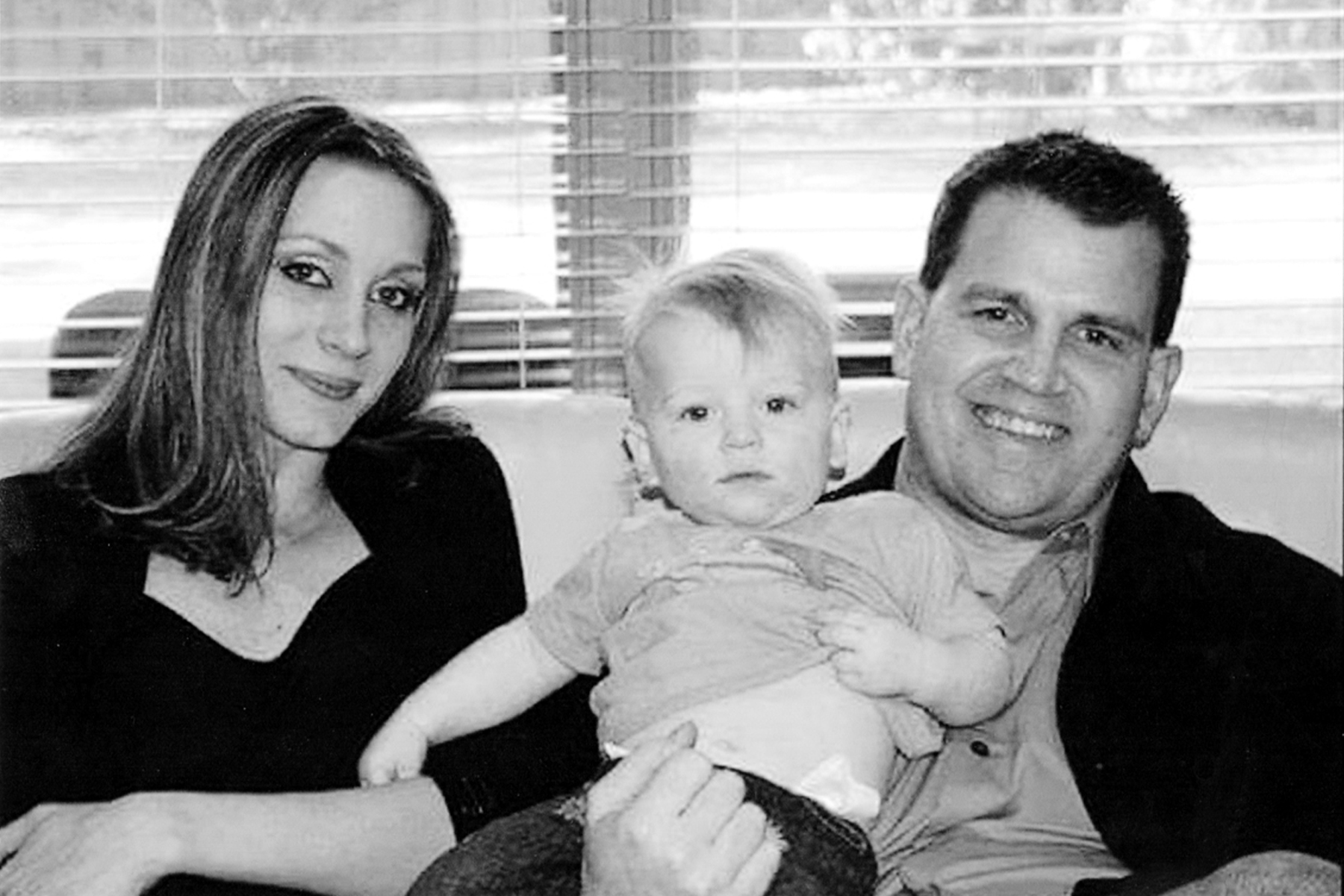
Her bright blond hair is pulled back into a ponytail, and she’s wearing a tank top with yoga pants. Last week, she had her third child, this one with her new partner. But she smiles softly as she talks about those early days with Duntsch, when they were still learning about each other’s lives. Before he cheated, before he lied. They met as Duntsch was looking for opportunities in an operating room somewhere. Within months, she says, he had offers in Dallas, San Diego, and New York. She had family in Dallas and decided she’d go with him if he chose that city.
She was dancing at a strip club then, and Duntsch’s business problems were growing more severe. Moving made sense for both of them. They lived in a future colleague’s condo at the W Hotel while they looked for a home in Plano, close to where Duntsch would be practicing. He signed a physician services agreement on May 24, 2011, with Rimlawi and Won’s Minimally Invasive Spine Institute. (Neither responded to requests for comment for this story.) The deal required Duntsch to gain privileges at Baylor Regional Medical Center at Plano. Base compensation was $600,000 a year for two years, beginning on June 14, 2011. Duntsch also received 40 percent of all revenue he generated beyond $800,000 each year.
According to court documents, Rimlawi soon grew suspicious of Duntsch. “Something was wrong,” one lawsuit alleges, “whether it be impairment from drugs, alcohol, mental illness, or a combination of all three.” His first and only surgery with Minimally Invasive Spine Institute was on a Thursday at Baylor Plano. Duntsch allegedly performed the operation and flew out to Las Vegas without securing a call physician. He was gone until Monday. The hospital called Rimlawi when it couldn’t reach his colleague. Days after Duntsch returned, he was fired. Duntsch maintains that the practice didn’t meet the promises it agreed to, and that it still owes him money. He says that surgery happened earlier in the week, and that it was he who called Rimlawi and asked him to check on the patient. Whatever happened, he was gone from Minimally Invasive Spine Institute—but not from Baylor Plano.
In the months following his surgery, Passmore focused on recovery and getting back to work. He didn’t contact a lawyer, although he wrestled with the decision. Instead, he thought about all those years he spent working and educating himself, all those years of paying bills on time to keep his credit high, of saving money to support his family. He thought about how all that might have been stolen from him in a matter of hours. But then came that fax, and he saw Duntsch’s name next to Kellie Martin’s.
Martin was a 55-year-old woman who had lived with back pain for nearly a year after a fall in her kitchen. She enlisted Duntsch to help fix it. Her body was in the Collin County Medical Examiner’s office in March 2012. The autopsy had not been finished when Passmore accidentally saw the fax from Baylor Plano. But upon seeing that name, he took it to his boss, Dr. William Rohr. He couldn’t help it.
“Dr. Rohr is a very professional man,” Passmore says. “He said, ‘It’s not your case, it’s another case, and we’re looking into it.’ I trust that man wholly.” But, he says, “It all started coming together in my head that this isn’t a one-time mistake.”
Passmore later discovered that, less than a week after his second surgery, Duntsch had operated on 45-year-old Barry Morguloff. According to his lawsuit, Morguloff wound up with searing pain in his back and left leg from bone fragments lodged in his spinal canal during the operation, which were only discovered eight months later when he sought a second opinion.
Duntsch calls this—and most other claims—nonsense. He has left a novel’s worth of defenses on the web, in PDFs, and in comments below news stories. He says he showed the postoperative imaging to “16 radiologists over six months,” all of whom said Morguloff was normal. Duntsch contends the patient was just trying to get painkillers. But Morguloff’s suit describes him being in “excruciating pain” and telling nurses that his pain was a 10 on a scale of 1 to 10.
Passmore also learned about Kenneth Fennell, a 68-year-old who alleged in a lawsuit that, during a November procedure, Duntsch operated on the wrong body part. Duntsch, again, maintains this wasn’t true. He says Fennell’s surgery went so well that he agreed to be in a commercial for Baylor Plano.
Martin, it turned out, had bled to death in the intensive care unit while undergoing a relatively common procedure known as a laminectomy, which involves removing spongy tissue between the discs to relieve pressure. Six weeks after her death on March 12, 2012, the medical examiner ruled her fate an accident. But Dr. William Rohr did editorialize in his conclusion: “The collection of blood was most likely the result of a therapeutic misadventure.” Duntsch blames the death on an allergy to fentanyl, a powerful narcotic often used in intubation. “Not a single doctor, surgeon, staff, or the pathologist of the autopsy every [sic] stated that I surgically caused vascular injury,” he wrote.
Passmore, an investigator by trade and by nature, started digging. He went back to the source—the University of Tennessee Health Science Center. He wanted to find who Duntsch trained under, who his supervisors were. He wanted to ask them questions.
“That’s when we stumbled across the gap,” Passmore says. He’d found a few months that were not accounted for in Duntsch’s educational history. “You don’t get to walk away from two or three years of medical training, in the middle of an internship or a residency, get to take time off and be slotted directly in the position you left in with no questions asked. Maybe that’s how they do it in Tennessee, but according to my training, that’s not how they do it here. Then it just started to all unravel.”
At first, Passmore didn’t think much about the way Duntsch and his assistant, Kimberly Morgan, interacted. “It was clear to anyone who’s not a complete idiot that they were a thing,” he says. But they were also, presumably, two consenting adults, and both were, presumably, qualified to fix the pain that was wrecking his lower body. Duntsch hired Morgan while he was still with the Minimally Invasive Spine Institute, and she began on August 29, 2011. He kept her on after splitting from Rimlawi and Won. In October 2011, she registered articles of incorporation to form Duntsch’s practice, the Texas Neurosurgical Institute.
That was the same month the two started having sex. Their trysts were largely confined to his office at Baylor Plano, the same place where, she said in her deposition, he often drank vodka and did research after hours. He kept a handle of Stoli under his desk and said it was because he used to work with Russians. In many ways, Morgan was the opposite of Young. She had clinical experience and often spent time with Duntsch when he was conducting research. She had brown hair, parted near the middle, that fell just below her shoulders. In a video recording of her deposition, she fidgets often, angling her head to look at a jug of Stoli, shaking her head yes or no, furrowing her brow at some of the questions.
Duntsch had moved from the W to Hotel Zaza and then, finally, to a five-bedroom house not far from the hospital. Young lived there, too, and she says Morgan was a frequent visitor. She didn’t think much of it at first. She assumed Morgan was only helping with research. Duntsch told Morgan a different story. He said Young—who by now had given birth to their son, Aiden—was just his secretary and friend.
By this time, Summers, the childhood friend, had come to live with Duntsch, too. He had a room upstairs in the Plano house. He also had a credit card in his name connected to Duntsch’s account and would drive him around, balance his checkbooks, pick up dry cleaning. Morgan says they spent a lot of time in clubs. Ghostbar, Dragonfly at Hotel Zaza. “If he wasn’t doing research, he was out with Jerry Summers, partying,” Morgan said in the deposition. Young puts Morgan there, too, although Morgan denied it in her deposition. Most of the time, she said, their relationship was confined to his office.
Morgan was present in the operating room during Passmore’s surgery. She says she didn’t hear or see any altercation between Duntsch and Mark Hoyle—her view was blocked by a microscope, and the combined hum of the EKG machine and the oxygen cylinder drowned out the sound of Hoyle’s pleading, if there was any. She was also present for Summers’ operation. But she wasn’t in the room when he woke up a quadriplegic, telling anyone with ears that Duntsch had been using cocaine the night before the procedure. Summers had come in for an elective spinal fusion to relieve the pain he’d carried for years after a car accident. According to Texas Medical Board records, Summers’ vertebral artery was damaged, and he lost more than two liters of blood while intubated. When his patient woke up in the recovery room unable to move his extremities, Duntsch failed to perform a CAT scan or MRI.
In her deposition, Morgan said Baylor Plano President Jerri Garison called both of them to her office and told them what Summers had said. Namely, that he’d been up all night snorting eight balls of cocaine (3.5 grams each) with Duntsch. She needed drug tests. Talking to the Dallas Morning News in 2014, Duntsch said he provided the test and was clean. Morgan, in her deposition, said Duntsch called her to say he got lost going to the lab and never took the test.
After Summers’ procedure, Morgan says Duntsch “was not allowed to operate” at Baylor Plano until March 2012. Martin was his first patient back, and it was the last operation he performed at that hospital. Multiple lawsuits allege that Baylor did not report Duntsch to the National Practitioner Data Bank, which was created by Congress to be a private clearinghouse of physicians who have been suspended or had their privileges revoked. It’s accessible only to hospitals, and facilities are federally mandated to report their delinquents. According to court filings, he was supposed to be overseen by an attending physician in the operating room; this allegedly was not adhered to, either.
On April 20, Duntsch submitted a letter to Baylor Plano’s medical staff services director, Patricia Sproles, saying he was moving his practice and resigning his clinical privileges. Sproles issued a letter to Duntsch that read: “There have been no summary or administrative restrictions or suspensions of Dr. Duntsch’s Medical Staff membership or clinical privileges during the time he has practiced at Baylor Reg. Medical Center at Plano.”
Morgan didn’t follow Duntsch after Baylor Plano. She says she even filed a temporary protective order against him in April 2012, after he showed up banging on her window at 2 am. She also never reported Duntsch up the ladder. She says she never saw him drunk or high or suffering from withdrawal symptoms. She says he was prone to hyperbole, and, yeah, he had a questionable sense of humor. She says his “favorite saying” was “You can kiss my black ass while I’m watching black-girl porn on my monitor.” Which may help explain why she didn’t report the three-page email he sent on December 9, 2011.
It was sent on a Friday at 4 am. The message alluded to a week where “everything unraveled” with their relationship. Duntsch suspected that this had something to do with his “vodka bottle” and “neurostimulants.” It said he was $1 million in debt. It said, “Anyone close to me thinks that I likely am something between god, einstein, and the antichrist. Because how can I do anything I want and cross every discipline boundary like its [sic] a playground and never ever lose.”
Duntsch also said he was prepared to embrace the very darkest part of himself. “You, my child, are the only one between me and the other side,” he wrote. “I am ready to leave the love and kindness and goodness and patience that I mix with everything else that I am and become a cold blooded killer.”
On average, a neurosurgeon generates more revenue for a hospital than all other specialties but invasive cardiology and orthopedic surgery. According to Irving-based physician recruitment firm Merritt Hawkins, a single neurosurgeon produced his or her hospital an average revenue of $2.45 million in 2015. Armed with Baylor’s declaration that it never amended his privileges, Duntsch found work in four months.
He performed his first operation at Dallas Medical Center on July 24, 2012; the hospital issued temporary privileges while it verified his credentials. During this time, out of three procedures, one patient died and another was partially paralyzed. Like Summers, Floella Brown’s vertebral artery was damaged, causing massive bleeding. Unlike Summers, Brown, 63, suffered from hypertension and was a stroke risk. She suffered a “massive posterior circulation stroke” and was transferred to UT Southwestern Medical Center. She arrived brain-dead. “No autopsy was done (at the family’s request) but it is well-documented that the stroke was due to a left vertebral artery injury due to Dr. Duntsch’s horrendous surgical technique,” wrote surgeon Randall Kirby in a letter to the Texas Medical Board. Kirby reported having “direct knowledge” of seven patients that “Dr. Duntsch has maimed or killed.” Hoyle, the surgeon who exposed the incision in Passmore, had also filed a complaint with the board. “I agree completely with Dr. Hoyle’s complaint to the board when he stated that Dr. Duntsch is the most careless, clueless, and dangerous spine surgeon either of us has ever seen,” Kirby wrote.
Duntsch had another surgery scheduled the day that Brown suffered her stroke. It was a revision of a patient whom he originally operated on at Baylor Plano. Mary Efurd, 74, was to have two vertebrae fused, linked by a metal plate. She woke up with severe pain and couldn’t stand. Henderson was brought in to operate two days later. He was shocked at the CT scan: the spinal fusion hardware sat in her soft tissue. The nerve root had been amputated. There were multiple screw holes nowhere near where they were supposed to be, and a screw had been lodged in another nerve root near the bottom of the spine. At that point, the administration revoked his privileges. Duntsch says he was so distraught by Brown’s outcome that he placed a screw in Efurd 3 millimeters away from where it should’ve been, damaging a nerve root. But that’s all.
“There is no way to communicate what happened there, without a 20-page document of disclosures and events and responsible parties,” Duntsch once wrote of Brown and Efurd. “That venue is a civil or federal jury trial, and I would accept that if it gave the way forward to disclose, remedy, address what happened at DMC with these patients.”
Henderson, like Passmore, began his own investigation. He recorded conversations with Foley, the head of the fellowship program, and Boop, the chairman. He called Baylor Plano President Jerri Garison, who was clearly familiar with Duntsch and was just as clear about how little she could say on the matter: “He no longer has privileges here, and I have to be very careful about what I say to you.” Baylor said it was unable to provide its executives for interviews because of Passmore’s pending lawsuit. In a statement, the hospital said it cooperated with the Texas Medical Board when asked, and did not file its own complaint because it was aware someone else already had. Baylor calls the allegations against it “extremely frustrating and difficult” and reiterates that Duntsch came with “references from multiple sources who worked with him in his residency and fellowship training programs.”
“To put these misleading allegations into fair context, Baylor Plano is part of a hospital system that has made substantial investments over several decades to continuously enhance the quality of care we provide our patients, and we have gained many recognitions for these processes. We certainly would not knowingly allow one person to compromise the level of quality care that we have worked so hard and invested so much to achieve for our patients and our community.”
By December, Duntsch wrangled privileges at Legacy Surgery Center of Frisco, and Kirby, in his letter to the Texas Medical Board, narrated another grim outcome: Jacqueline Troy’s vocal cord was paralyzed, and her esophagus and trachea had become connected, “an unheard of complication.” A corrective surgery happened two weeks later, after she arrived at the emergency room of Texas Health Presbyterian Dallas, where Kirby practiced.
But Duntsch soldiered on. Around May 2013, Henderson got a call from Foley, the fellowship supervisor. He’d received a letter from University General Hospital in South Dallas, verifying Duntsch’s training. Foley said Duntsch was satisfactory in his fellowship, that he saw no evidence of the things he was accused of in Dallas happening in Memphis. And, seeing as how the hospital was asking specifically about that training, Foley said he didn’t feel comfortable expressing concern about what he’d heard was happening in Dallas. He hadn’t seen it with his own eyes. It was hearsay, he contended.
“I can’t write on this form, Oh, by the way, I heard from Dr. Henderson about what sounds like major patient issues that you ought to look into,” Foley said in the call. “There’s no blank here for that.”
Duntsch made a major miscalculation when he ventured south into Dallas to practice. He may have figured, at first, that he was protected. Texas’ tort reform laws cap the amount that patients can sue physicians for malpractice at $250,000. And, to successfully sue a hospital, they must prove that the facility acted with malice—that, in granting a physician privileges, it intended to harm the patient. An incredibly difficult thing to prove. But what Duntsch hadn’t counted on was the Dallas County District Attorney’s Office.
After another disastrous outcome, this time at University General, Kirby and malpractice attorney Kay Van Wey decided to turn to the criminal justice system. At University General Hospital, Kirby had been granted emergency privileges to operate on a Duntsch patient named Jeffery Glidewell. He discovered a significant esophageal injury that belabored Glidewell’s breathing and found a sponge that had been left in the soft tissue of his neck. He, too, had an injury to his left vertebral artery, and the incision was far from where it should’ve been and had begun to leak pus.
Despite receiving complaints dating back to 2012, the Texas Medical Board didn’t revoke Duntsch’s privileges until June 2013. That same month, Kirby wrote, he, along with the Glidewell family, brought the case to prosecutors and asked to press charges. “I am beginning to think the police are the only ones intellectually and physically capable of getting to the bottom of this matter,” he wrote.
Meanwhile, Duntsch was struggling financially and started racking up a series of strange arrests. While staying with his parents outside Denver, he was stopped for driving under the influence. The arrest report says that he was driving on two flat tires, and one was “completely gone and was on the rim.” Officers found an empty bottle of Mike’s Hard Lemonade on the floorboard and a full one in the console. In September 2014, after he and Young had separated, Duntsch was arrested for jumping the fence of Young’s sister’s Garland home and attempting to take their child, Aiden. At the time, Young was giving birth to their second boy. (She says this was a misunderstanding, that she had asked him to retrieve Aiden and bring him to the hospital.) In April 2015, he was arrested for stealing $887.30 in Walmart merchandise: five pairs of sunglasses, five watches, two pairs of shoes, four ties, two briefcases, a wallet, cologne, necklaces, a walkie-talkie. He filed for bankruptcy in Denver, and wound up selling off the shares in Discgenics for a tenth of their value.
Duntsch was also picked up wandering near a Chase Bank in North Dallas and taken to Green Oaks psychiatric hospital for an evaluation. Young says he’d been breaking into her apartment, and one day she came home to find him inside, covered in blood. He told her he had been attacked by an investigator for the attorneys representing his patients, but that was never corroborated.
Finally, in July 2015, the Dallas County District Attorney’s Office followed through. A grand jury returned five indictments of aggravated assault and one of harming an elderly person.
“I cannot recall a physician being indicted for aggravated assault for acts committed during surgery,” says Toby Shook, a Dallas defense attorney who spent 23 years working as a Dallas County prosecutor. “And not just Dallas County—I don’t recall hearing about it anywhere.”
Duntsch pleaded not guilty. He’s jailed on a $600,000 bond, and his trial is set for January 31, 2017. In emails, he alleges that he was at the center of a vast conspiracy to bilk money from the hospitals where he practiced. He argues that the patients were just telling stories and that Passmore was fine after his operation. Why else would his daughter have sent Duntsch a card thanking him?
But patient advocates and the surgeons that mobilized to rid him of his license say that Duntsch was the perfect storm. Nobody stopped him soon enough. The hospitals didn’t do their due diligence until it was too late, and those who could’ve spoken up didn’t. Every patient mentioned in this story who has sued, except for Passmore, has settled. They all signed nondisclosure agreements that prohibit them from discussing their cases or their monetary awards. As one lawyer told me off the record, they faced an almost impossible dilemma: settle and give their families a financial cushion for the future medical costs but sacrifice their right to tell their stories.
Passmore is still fighting. He has taken Baylor Plano to court to change the Texas law requiring patients to prove that a hospital intended to harm them when it granted privileges to someone who was unsafe. Governor Greg Abbott, then the attorney general, even waded into the whole mess, filing a brief in Passmore’s suit in support of the law. But Passmore knows it’s his battle to fight. Who else is left?
“I don’t have Facebook, I don’t Myspace. I have taken one selfie in my life—on a dare. I don’t want my name out there. I don’t want to be in your magazine, sir, I apologize,” Passmore told me. “I don’t want to be on Channel 8, I don’t want to be on Inside Edition. But it’s the only way to get anybody to listen. It might be Baylor, it might be somebody down in Austin, it might be somebody somewhere, but it’s the only way you can get your voice out there. The thing is, if you don’t push this, with everybody else settling, they’re getting away with it again.”
Author



